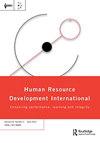关心人力资源开发在实践中是什么样子的?以巴西两家社会企业为例
IF 3.9
Q2 MANAGEMENT
引用次数: 0
摘要
2019冠状病毒病大流行的影响,加上对社会福祉的一系列其他严重威胁(如不平等、系统性种族主义和环境退化),凸显了护理伦理作为人力资源开发指导规范的重要性。然而,目前对关怀作为人力资源开发实践的理解是有限的,并且主要是在领导者对员工行为的背景下进行研究。本研究通过对位于联合国教科文组织世界遗产巴西塞拉达卡皮瓦拉国家公园周边贫困社区的社会企业进行案例研究来解决这一缺陷,以检查关怀人力资源开发是什么样子的,以及如何在组织中实施。我们进行了一项基于访谈和文献分析的定性研究,以绘制这些社会企业实施护理实践的流程。我们的研究结果表明,关怀人力资源开发需要一种互惠和系统的方法,与在协作和复杂的社会环境中运作的组织高度相关。我们观察到,道德价值观是关怀方式的关键要求,必须嵌入组织的使命、文化和流程中。我们的工作通过提供针对整个组织系统(包括周围环境和社区)的策略,扩展了人力资源开发文献中提出的护理干预措施的范围。本文章由计算机程序翻译,如有差异,请以英文原文为准。
What does caring HRD look like in practice? A case study of two social enterprises in Brazil
Impacts of COVID-19 pandemic, combined with an array of other severe threats to societal well-being (e.g. inequality, systemic racism, and environmental degradation), have shed light on the importance of ethics of care as a guiding normative for HRD. However, the current understanding of care as HRD practice is limited and primarily studied in the context of leaders' behaviours towards employees. This study addresses this shortcoming by conducting a case study of social enterprises located in impoverished communities surrounding the UNESCO World Heritage Site Serra da Capivara National Park, Brazil, to examine what caring HRD looks like and how it can be operationalised in organisations. We conducted a qualitative study based on interviews and documentation analysis to map the flow of care practices implemented by these social enterprises. Our findings suggest that caring HRD entails a reciprocal and systemic approach highly relevant to organisations operating in collaborative and complex social contexts. We observed that moral values are critical requirements for a caring approach and must be embedded in the organisation's mission, culture, and processes. Our work expands the range of care interventions proposed in HRD literature by offering strategies that target the whole organisational system, including the surrounding environment and community.
求助全文
通过发布文献求助,成功后即可免费获取论文全文。
去求助
来源期刊

HUMAN RESOURCE DEVELOPMENT INTERNATIONAL
MANAGEMENT-
CiteScore
11.40
自引率
11.10%
发文量
43
期刊介绍:
Human Resource Development International promotes all aspects of practice and research that explore issues of individual, group and organisational learning and performance. In adopting this perspective Human Resource Development International is committed to questioning the divide between practice and theory; between the practitioner and the academic; and between traditional and experimental methodological approaches. Human Resource Development International is committed to a wide understanding of ''organisation'' - one that extends through self-managed teams, voluntary work, or family businesses to global enterprises and bureaucracies. Human Resource Development International also commits itself to exploring the development of organisations and the life-long learning of people and their collectivity (organisation), their strategy and their policy, from all parts of the world. In this way Human Resource Development International will become a leading forum for debate and exploration of the interdisciplinary field of human resource development.
 求助内容:
求助内容: 应助结果提醒方式:
应助结果提醒方式:


